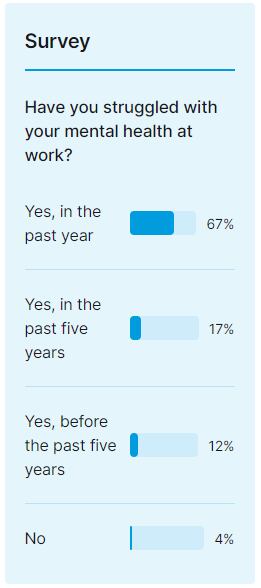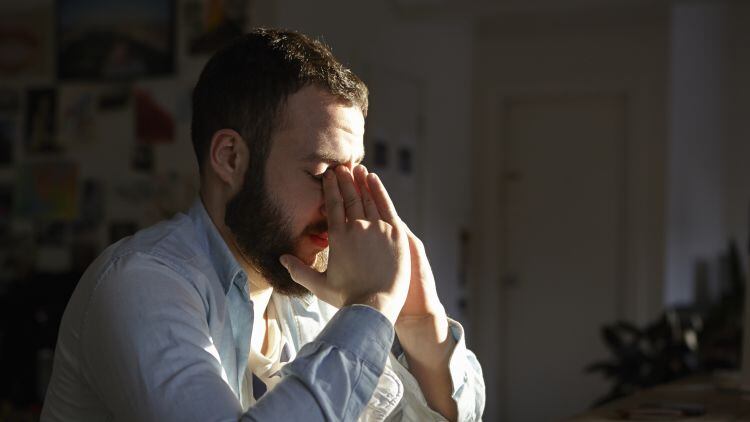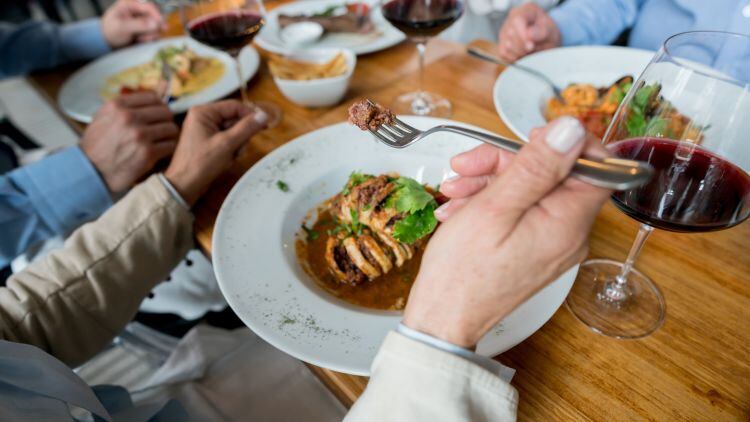The hospitality sector has a mental health problem, with approximately three out of five hospitality workers struggling with a mental health issue in their career, according to Hospitality Action's Mental Health Survey 2020.
This number has risen throughout the pandemic, which has seen nearly three-quarters of hospitality sector staff struggle with their mental health, revealed research by High Speed Training, making it urgent for companies to address the issue of mental illness.

Childhood sexual abuse left chef Nick Wood mentally “scarred”, with his mental health further damaged by an unprovoked physical attack years later after which he “went into [his] shell again.”
It was sharing his problems with a counsellor that helped Wood, showing him “the importance of talking”, making him wish he’d spoken sooner.
Wood said staff were more likely to open up in spaces they felt “loved and welcomed”, which could look like making sure there were soft drinks, nutritious things to eat and clean chef whites in the kitchen.
Who's looking after the manager?
For Wood, talks about mental health in hospitality needed to include senior staff, who were often overlooked as were assumed to be in a good position in life.
Wood said: “You might have a conversation with your commis chef and kitchen de partie chef, but who's looking after the general manager? Who's doing that?”
It would have helped Nick if another staff member had noticed something was wrong and had taken time to talk to him.
“We can't just look after junior people, we need to look after the senior people as they could be going through things as well,” said Wood.
Former chef at Belomond Le Manoir aux Quat-Saisons Michael Collier said it was vital for companies to employ empathetic leaders who invested energy into understanding staff.
“Sometimes people focus on the commercial side of the business too much, but at the end of the day, you're not going to get these bottom lines without the people,” he said.
Speaking out
Collier was approaching his 21st birthday when he was told he had a cancerous growth which “stopped [him in his] tracks”.
“You don't have to always be on cloud nine. Go take some time to have a low day, or a day at home, and know you're not burdening people.”
A month after the diagnosis, Collier had a breakdown at work that left him crying in the office. A colleague encouraged him to apply for Hospitality Action’s counselling sessions that proved to be a “lifeline”.
Collier said it was crucial for struggling staff to know reaching out for support was not a weakness.
He said: “You don't have to always be on cloud nine. Go take some time to have a low day, or a day at home and know you're not burdening people.”
Liberation Group executive chef Alice Bowyer said the pandemic has given the industry the opportunity to reconsider its “work hard, play hard” culture that made it hard for staff to voice their feelings.
Bowyer said practical changes could go a long way in improving staff mental wellbeing and preventing burnout.
This could include rejigging the kitchen design to include adjustable-height work benches which reduce back pain and use of induction to cool the temperature.
Furthermore, Bowyer suggested managers could write rotas months in advance, so staff could plan their home life around their work schedule.
To minimise financial stress, the Liberation Group menus also included an optional service charge which Bowyer said had made a “huge difference” to the teams’ earnings.
Taking care
UKHospitality chief executive Kate Nicholls said mental health was “everybody’s responsibility”, and customers, colleagues, employers and managers all had a role in looking after each other’s mental health.
“We need to make sure staff and customers are aware there is that zero tolerance of anything that damages people's mental health and wellbeing, and we should call people out on [bad behaviour],” Nicholls said.
“We, as an industry, have got our arms around you and we’ll make sure you’re okay.”
She added: “Nobody needs to struggle with mental health and wellbeing problems alone.
“We, as an industry, have got our arms around you and we’ll make sure you’re okay.”
The Burnt Chef Project is an organisation working to eradicate mental health stigma in hospitality through services including a 24/7 support service, HR support and mental health training workshops.
Founder of the Burnt Chef Project Kris Hall said aside from the organisation’s services, taking care of physical health through sleep, healthy eating and exercise could help improve mental health.
Furthermore, he said mindfulness was a useful tool to overcome difficulties in the moment, whereas journaling could be a part of a longer-term strategy for bettering mental health.
However, Hall said it was important to remember that different strategies worked for different people at different times.
He said: “Only try what you feel comfortable with and try not to put too much pressure on yourself.
“If something isn't working for you, or doesn't feel possible just now, you can try something else, or come back to it another time.”
A range of support
Hospitality Action, an organisation providing current and retired hospitality workers with support, has a wide range of services for those struggling with mental health.
Hospitality Action’s services director Camilla Woods said: “Anybody in the industry can call our helpline that runs 24/7, 365 days a year, and provides people with in-the-moment support.
“We also have a lot of information on our website in our advice hubs. […] We have a lot about virus anxiety and those concerned about their financial situation, which has a big impact on people's mental health."
The company additionally provides face-to-face, telephone and video counselling for those experiencing a range of issues including bereavement, depression, anxiety and addiction.
Woods said: “We also have a managerial advice line, so if someone is managing somebody and they're concerned about them, they can call in and one of the advisors on the assistance line team will talk them through what they can advise and signpost for that person.”
Hospitality Action also has training courses on mental health awareness and building workplace resilience, available for any industry employer to book.
If you are struggling with your mental health, find support at:
Hospitality Action: https://www.hospitalityaction.org.uk/
The Burnt Chef Project: https://www.theburntchefproject.com/




